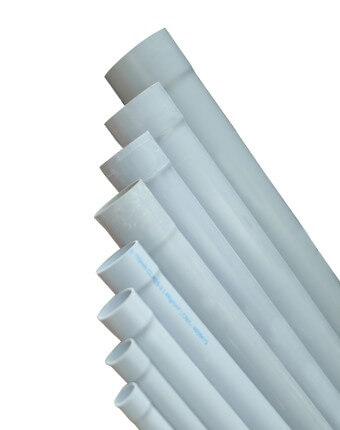Proper plumbing is crucial for any home, and in Kerala, where the climate arouses challenges, choosing the right materials is key. PVC pipes have become a popular choice for home plumbing due to their durability, cost-effectiveness, and adaptability to local conditions. This blog presents an essential checklist for selecting and installing PVC pipes in your home, ensuring a leak-free and efficient plumbing system.
Types of PVC Pipes Available in Market
PVC pipes come in various types, with the most common being Schedule 40 and Schedule 80. In the Indian market, ISI-marked pipes are a reliable choice, ensuring they meet quality standards. For most home plumbing needs, Schedule 40 pipes are sufficient, offering a balance between cost and durability. However, for areas that require higher pressure resistance, such as connection points with water tanks, Schedule 80 pipes might be more suitable.
Applications of PVC Pipes in Kerala Homes
PVC pipes are versatile and are commonly used in Kerala for water supply lines, drainage systems, and even electrical conduit applications. Their resistance to rust and corrosion makes them ideal for the humid and saline conditions often found in coastal regions of Kerala.
Advantages of Using PVC Pipes in Kerala
PVC pipes are lightweight, making them easy to transport and install, which is a significant advantage in the narrow and often steep terrain of Kerala. Additionally, they are resistant to chemical reactions, which is important in areas where the water might have a high mineral content. Their endurance and minimal maintenance make them a budget-friendly choice for homeowners in Kerala.
Checklist for Choosing the Right PVC Pipes
Determine Pipe Size Requirements
Selecting the correct pipe diameter is crucial for maintaining proper water flow and pressure in your home. In Kerala, where water pressure can vary greatly depending on the location (e.g., hilly areas vs. coastal plains), choosing the right pipe size is essential. For example, a 1-inch diameter pipe is typically used for main water lines, while smaller pipes are suitable for individual taps and fixtures. Consulting local plumbing standards or a professional can help you make the best choice.
Check for Pressure Ratings
The pressure rating of a PVC pipe indicates how much pressure it can withstand before failing. In Kerala, homes with overhead water tanks or those using pumps to boost water pressure need to consider this factor carefully. Pipes with a higher-pressure rating, such as Schedule 80, should be used in these scenarios to prevent bursting or leaks.
Consider Temperature Tolerance
Kerala’s climate is characterized by high humidity and temperatures as well as rain. PVC pipes are generally resistant to these conditions, but it’s essential to select pipes that can handle the temperature extremes, particularly if they will carry hot water from geysers. Pipes designed for higher temperature tolerance will prevent warping or degradation over time.
PVC pipes are an excellent choice for home plumbing in Kerala, offering durability, ease of installation, and resistance to the region’s unique environmental challenges. By following this checklist, you can ensure a successful and long-lasting plumbing project that meets the needs of your home.
